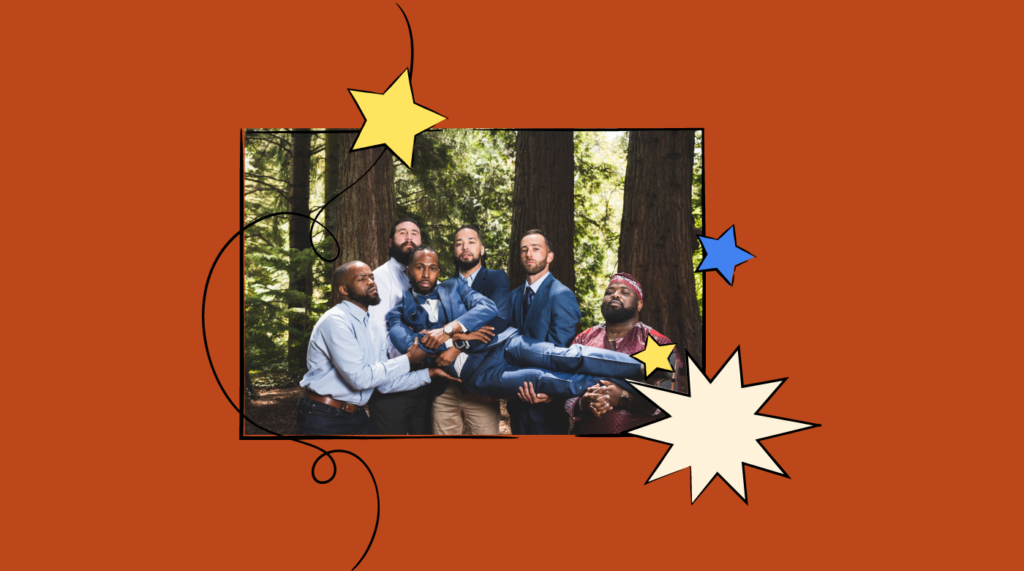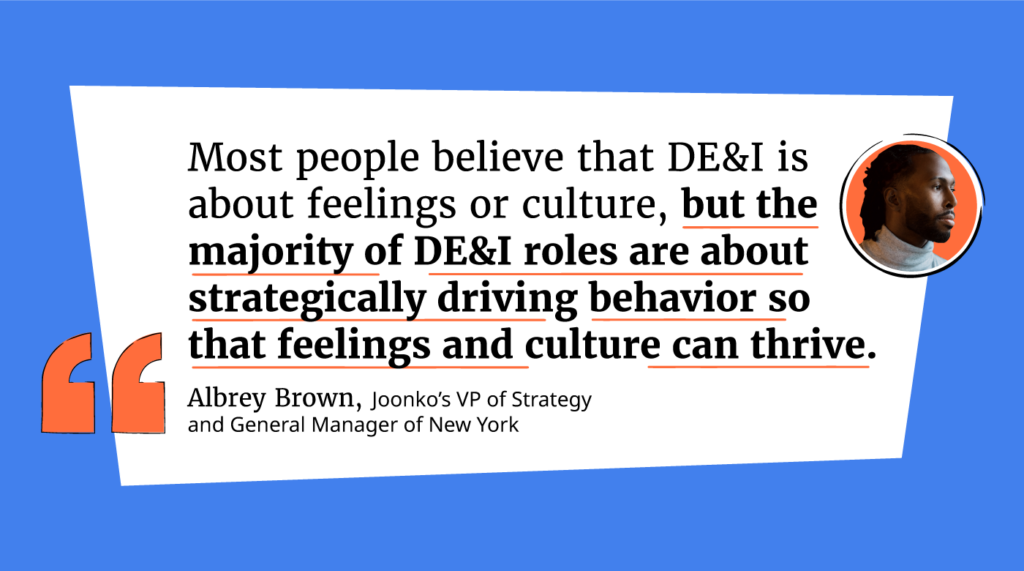AuthorWrite something about yourself. No need to be fancy, just an overview. Archives
April 2024
Categories |
Back to Blog
We’re passionate about the world of work, and how we can make it better. To help satisfy our curiosity, we’ve launched an interview series where we pick the brains of experienced leaders, business owners, managers, and individual contributors to get their thoughts on how we can collectively build better workplaces. Join us in our next installment below as Albrey Brown--Joonko’s VP of Strategy and General Manager of New York—shares his insights with us. We’d love to get to know you a bit better, tell us a bit about your backstory.I’ve always been hyperfocused on unlocking opportunities for underrepresented people throughout my career, and I’ve had the opportunity to focus on this at different stages. At Telegraph Academy, I helped build a school that taught over 1000 underrepresented adults to be software engineers, and got over 190 of them jobs. 
I previously had roles at Pivotal Software, Inc., DocuSign, and most recently at Airtable, where I worked with People Teams to help design cultures that actively enabled equity. At Airtable, my team trained recruiters and hiring managers to prioritize recruiting underrepresented candidates from the start—I led Diversity and Inclusion at the company when we were under 150 employees. Now at Joonko, I am directly involved in building the first sourcing platform focused solely on underrepresented candidates and helping more than 200 companies like Adidas, Accenture, American Express, Crocs, PayPal, Northwestern Mutual, and Intuit hire underrepresented talent. If we were to ask a friend to describe your personality to us, what would they say?Gregarious and optimistic. I’m often described as relatable, and easy to talk to. I often have intimate and vulnerable conversations with random strangers in New York. Working with people as a profession comes naturally to me. Admittedly, my overly optimistic attitude is a lot for most people. I sometimes have to throw in a constructive comment to make sure people don’t think I’m a robot. Thinking back to your career journey, what’s an interesting story that stands out?I was studying to attend a coding bootcamp in February 2014. The admissions test was known to be very difficult; most students failed the first time, studied for 6 weeks, and passed the second time. I was on a tight timeline (and budget), and needed to join the April class. Failure was not an option. During the day of my admissions interview, I was very confident in my skills. As I started to take the test, though, things fell apart quickly. My interviewer stopped the interview early and said, “I think you should take 6 weeks to study, before trying again.” In my desperation, I looked at her and said, “no.” She looked puzzled, and I went on, “I need to join the next class. I can pass this, just give me a week.” She reluctantly agreed and gave me a link to her personal calendar. I studied my butt off for a week, passed the test, and joined the following cohort. That experience taught me two lessons: don’t take no for an answer, and give people more time than you think they need to be great.
What’s the most impactful lesson you’ve learned over your career thus far?Meet people where they are. My time in diversity, equity, and inclusion taught me that everyone is on a different part of their journey. I had to understand where people are coming from, where they want to go, and how I can help them get there. This concept applies to people development, professional development, and project development. After all, everything we accomplish involves people. 
Thanks for giving us some insight into who you are! Let’s jump into things. When you hear the phrase “build a better world of work,” what comes to mind?A workplace that serves the needs of its people, as much as the people serve the needs of the business. Companies that acknowledge and honor the way that employees work can serve employee needs the best. A concrete example is a flexible work schedule and location. “Work” used to be a place you go, but it’s evolving into something a lot bigger than that. The best thing an organization can do is survey their team, understand how they’d like to work, and do whatever they can to align expectations around that. For you, what’s the main blocker you see as standing in the way of building a better world of work?People’s misconception of Diversity and Inclusion being a strategic function. Most people believe that DE&I is about feelings and culture, but the majority of DE&I roles are about strategically driving behavior so that feelings and culture can thrive. For example, at DocuSign we asked our recruiters to record the number of underrepresented candidates they reached out to in a given week and this simple behavior change forced recruiters to face their “awkward” feelings about not being able to find many URG candidates. This ultimately helped us build a culture where stating those feelings was more than okay, but they were encouraged and embraced.
What’s one thing within our control that we can practically do to build a better world of work today? And, how do you recommend going about it?Talk to employees, early and often. My background is in product and entrepreneurship. The majority of those jobs are talking to customers. I’d encourage People Teams and business leaders to treat employees like internal customers; talk to them more often, record their feedback, and implement reasonable improvements. The bi-yearly, Employee Voice Survey, is important, but gathering continuous feedback is both in our control, and allows us to make agile decisions about how work should be conducted. Can you share one thing you’ve experienced, seen, or read about that is leading us towards a better world of work?I recently read the latest Mckinsey Women in the Workplace Report. The thesis of the report is that women are leaving jobs at the highest rates we’ve ever seen. Not out of fear, but out of a desire to get more out of their careers, and workplaces. This quote really stood out to me: “Women leaders are significantly more likely than men leaders to leave their jobs because they want more flexibility or because they want to work for a company that is more committed to employee well-being and DEI.” Talented, experienced women are holding companies accountable to building a better world of work. I hope this forces companies to invest in the evolution of work at with greater urgency. I’m curious, thinking about building a better world of work, is there a company and/or leader who stands out to you as someone we should follow? If so, what are they up to?Madison Butler, Chief People Officer at Grav, is a must follow on LinkedIn. She tackles tough topics with practical advice covering all spectrums of culture and diversity work. Her posts have taught me a lot and challenged me to be a better people leader over the years. How can our readers follow your work?I can be found on LinkedIn and Twitter. Thank you for adding your voice to People Managing People’s interview series on How to Build a Better World of Work!Add your voice to the conversationJoin our interview series and share your ideas for how we can build a better world of work! The post Changing Misconceptions Around DEI Will Help Us Build A Better World Of Work appeared first on People Managing People. via People Managing People https://ift.tt/DTwc0Qp
0 Comments
Read More
Leave a Reply. |
 RSS Feed
RSS Feed
